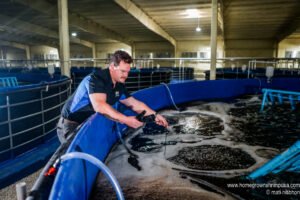That’s great to hear! Indoor farming of shrimp is a sustainable and eco-friendly way to produce high-quality seafood. By raising shrimp indoors, you can control the environmental conditions and ensure that the shrimp are free from harmful chemicals and pollutants.
In addition, indoor farming can reduce the carbon footprint of shrimp production by minimizing transportation and reducing the need for feed inputs. The result is a delicious and nutritious product that is both healthy for you and the planet.
I’m sure that your indoor farm shrimp are not only sustainable and delicious but also a great example of how we can produce food in a more sustainable way. Keep up the good work!
What are the benefits of indoor farm shrimp?
There are several benefits of indoor farming of shrimp, some of which include:
Sustainable and Eco-Friendly: Indoor farming of shrimp is a sustainable and eco-friendly way to produce seafood. By controlling the environmental conditions, such as water quality and temperature, indoor farming can minimize the environmental impact of shrimp production, reduce the carbon footprint, and ensure the health and well-being of the shrimp.
Year-Round Production: Unlike traditional shrimp farming, which is often limited by season and climate, indoor farming allows for year-round production. This can lead to a more consistent supply of fresh shrimp, regardless of the time of year.
Controlled Environment: Indoor farming provides a controlled environment, which allows for the optimal growth and development of the shrimp. This can result in higher yields and better quality shrimp.
Reduced Risk of Disease: By controlling the environment, indoor farming can reduce the risk of disease outbreaks and minimize the need for antibiotics or other treatments.
Local Production: Indoor farming can be done in urban areas, bringing production closer to consumers and reducing transportation costs and emissions.
Overall, indoor farming of shrimp offers a sustainable, eco-friendly, and high-quality alternative to traditional shrimp farming.








